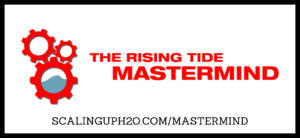 “Credentials have been one of the most important ways to help promote public health and safety and prevent disease, dismemberment, or death.” – Christoph Lohr
“Credentials have been one of the most important ways to help promote public health and safety and prevent disease, dismemberment, or death.” – Christoph Lohr
Elevate your expertise in water treatment by diving into this enlightening episode, where we explore the realm of certifications and their profound impact on the water treatment community. Join Christoph Lohr, Vice President of Technical Services and Research at IAPMO, an advocate for education and collaboration, as he unravels the world of credentials, codes, and the driving force of litigation in shaping cutting-edge water system designs.
Discover the wealth of educational opportunities offered by IAPMO (The International Association of Plumbing & Mechanical Officials) and how pursuing certifications like ASSE 12080 (Professional Qualifications Standard for Legionella Water Safety and Management Personnel) can pave the way for a brighter tomorrow. Christoph delves into the nuances of several certifications, shedding light on their significance for water treaters.
Unravel the debate on pronouncing ASSE’s (American Society of Sanitary Engineering) “12080” correctly—hint: it’s “twelve thousand eighty.” Gain valuable knowledge on the ASSE 12080 certification process, how plumbers and water treaters can learn from one another to improve public health, how to become involved with standards, the buffet of options for plumbing design and installation plumbing codes, and preventing water-borne illness through collaboration.
Furthermore, this episode touches on IAPMO’s Water Demand Calculator replacement for Hunter’s Curve and its profound impact on pipe size, stagnation, biofilm, and the factors contributing to Legionella growth.
For industrial water treaters, this episode serves as a treasure trove of information, guiding them in selecting certifications aligned with their career aspirations. Christoph’s expertise illuminates the importance of certifications in building a knowledgeable workforce for water management programs, ultimately contributing to enhanced public health. Tune in, scale up your education, and embark on a journey towards a more impactful and informed career in water treatment.
Timestamps
01:00 – Trace Blackmore encourages you to get your CWT in 2024
06:25 – Drop by Drop With James McDonald
09:35 – Interview with Christoph Lohr, Vice President of Technical Services and Research at IAPMO, about the importance of credentials for water professionals
55:00 – A bit more about IAPMO (The International Association of Plumbing & Mechanical Officials)
Quotes
“The true benefit of a certification is that it gets everyone speaking the same language. The real strength is that it gets everyone on the same page.” – Christoph Lohr
“The plumbing industry needs industrial water treaters and industrial water treaters need the plumbing industry. It’s a really symbiotic relationship.” – Christoph Lohr
“One of the biggest misnomers that people think about plumbing codes is that they are restrictive. We have to realize when it comes to plumbing design and installation, that plumbing codes are more like a buffet of options than a restrictive methodology.” – Christoph Lohr
Connect with Christoph Lohr
Phone: 248.736.4940
Email: christoph.lohr@iapmo.org
Get involved with IAPMO: standards@iapmostandards.org
IAPMO Website: IAPMO.org
LinkedIn: in/christoph-lohr-pe
Listen to the The Authority Podcast: Plumbing and Mechanical on your favorite podcast player or on YouTube.
Read or Download Christoph Lohr’s Press Release HERE.
IAPMO Links Mentioned
Get involved with IAPMO – standards@iapmostandards.org
The Authority Podcast’s episode with Trace Blackmore
AWWA IAPMO 2022 Manual – The Safe Closure and Reopening of
IAPMO and AWWA’s Recommended Practices for the Safe Closure and Reopening of Building Water Systems
IAPMO’s Uniform Plumbing Codes
IAPMO’s Water Demand Calculator
ASSE/IAPMO/ANSI Series 12000-2021
IAPMO’s Water Efficiency and Sanitation Standard (WE•Stand)
Organizations and Articles Mentioned
The Risks of Sizing Plumbing Systems Using Hunter’s Curve
Dr. Janet Stout’s Special Pathogens Laboratory
AWT (Association of Water Technologies)
The International Water Conference (IWC)
Emerging Water Technology Symposium (EWTS)
American National Standards Institute (ANSI)
NASEM’s article Management of Legionella in Water Systems
National Academies of Sciences, Engineering, and Medicine (NASEM)
The National Academies of Sciences, Engineering, and Medicine
Plumbing & Mechanical Engineer
Manual of Water Quality for Plumbing Industry Professionals and Building Managers
The Environmental Science, Policy and Research Institute (ESPRI)
American Society of Plumbing Engineers (ASPE)
ASPE Engineering Methodologies to Reduce the Risk of Legionella in Premise Plumbing Systems
Plumbing Manufacturers International (PMI)
National Fire Protection Association (NFPA)
Water In Healthcare Facilities: The Public Health And Economic Nexus
International Water, Sanitation and Hygiene Foundation (IWSH)
Other Links Mentioned
CWT Prep Course found at Scalinguph2o.com/CWTprep
Mary Ann Dickinson of the Alliance for Water Efficiency (A4WE)
Scaling UP! H2O Academy video courses
Books Mentioned
The Three Ages of Water: Prehistoric Past, Imperiled Present, and a Hope for the Future by Peter Gleick
The Crux by Richard Rumelt
Let There Be Water: Israel’s Solution for a Water-Starved World by Seth M. Siegel
Drop By Drop with James
In today’s episode, I have a challenge for you. My challenge is… to test for phosphate in your makeup waters.
You may be very surprised by what you find. Municipalities frequently add phosphate-based products for corrosion, scale, and staining control. Unknown sources of phosphate can certainly throw a boiler or cooling tower program out of control. Start with the orthophosphate test. If polyphosphates are used, you may need to run a digestion procedure or have your lab do it. Lastly, calling your municipality to ask if they use phosphate-based products in their water may actually be the first place to start. Don’t let an unknown phosphate source throw your water treatment program out of control.
2024 Events for Water Professionals
Check out our Scaling UP! H2O Events Calendar where we’ve listed every event Water Treaters should be aware of by clicking HERE or using the dropdown menu.


